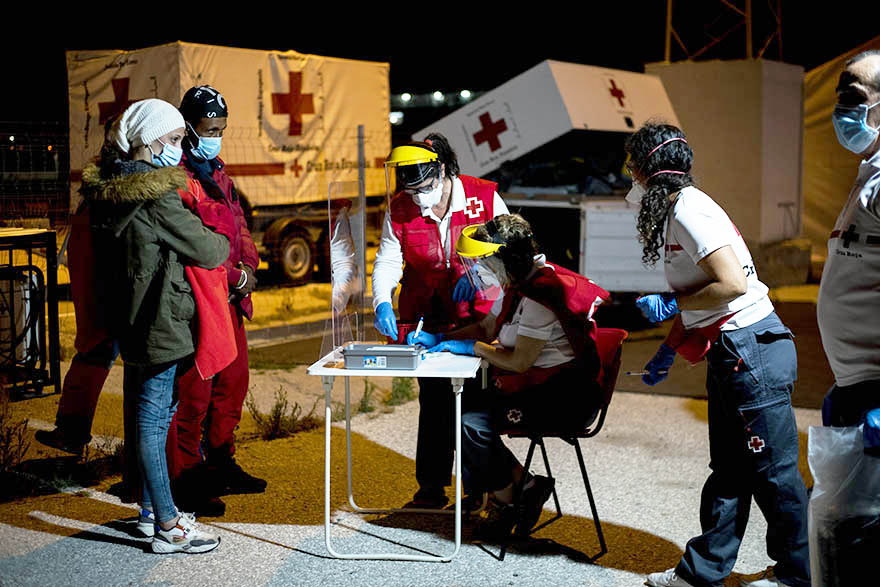The Covid-19 crisis: a moment of truth for migration policies

Members of the Red Cross register a couple of Maghreb migrants at the port of Motril, Spain. Photo: Carlos Gil Andreu/Getty Images
The flow of migrants crossing the Mediterranean Sea continues despite the Covid-19 pandemic. The difference, NAI researcher Jesper Bjarnesen points out, is that European states are using the outbreak as yet another reason to prevent migrants from reaching their shores.
“The view of African migrants as potential carriers of the coronavirus persists even though Europe is at the heart of the outbreak. Some European politicians justify strict border closures by saying that they prefer to do too much now, rather than regret having done too little”, Bjarnesen adds.
Yet, the pandemic has not fundamentally changed how the European Union (EU) and the African Union (AU) discuss and negotiate migration, according to Bjarnesen. Rather, they have hardened their positions. The AU views migration as a development question connected to remittances and the possibility of scholarships for students, whereas the EU considers migration mainly as a security issue.
However, a compromise from the EU is to address root causes of migration. The idea is that if people in African countries are lifted out of poverty they will not migrate. Building schools and creating jobs will thus keep Africans from wanting to go to Europe. Bjarnesen, however, rejects this notion as untrue.
“Inequality is the driver of migration, not poverty or lack of education. Having a job does not mean migrating is out of the picture. If undocumented work in Europe pays more than a proper job at home, that will always be a motivation to travel, even during a pandemic”.
Worryingly, Bjarnesen notes, global solidarity and international agreements have been cast aside – governments tend to look after themselves when times are difficult. One such agreement at risk of being neglected is the Global Compact for Safe, Orderly and Regular Migration that nearly all UN member states signed in late 2019. It provides new ways of looking at migration and connects migration governance to the UN’s Sustainable Development Goals.

NAI researcher Jesper Bjarnesen.
“The Global Compact was an important achievement in shifting the narrative on migration away from simplistic political rhetoric. Then came the corona outbreak, and now the same old rhetoric that frames migration as a security threat to the global North is being heard again. The pandemic is the first real test of whether this agreement is worth the paper it is written on”.
Fear of decreased commitment globally was perhaps behind UN Secretary-General António Guterres’ recent statement that the Covid-19 crisis is an opportunity to reimagine human mobility. Guterres pointed out that no country can fight the pandemic or manage migration alone. It requires a joint effort because no one is safe until everyone is safe. He also pointed out that one in eight of all the world´s nurses works in a country different from where they were born.
The one good thing that might come out of this pandemic, Bjarnesen says, is that migrants and their occupations, which are often invisible, are now considered an essential part of the workforce.
“Migrants with relatively little formal education are actually being acknowledged as essential workers. These migrants work in our health sectors, they do our cleaning and they deliver things to people stuck in quarantine at home. This work is now being noticed and appreciated”, Bjarnesen remarks.
However, he finds it peculiar how this newfound appreciation reflects a familiar hypocrisy in the global North, which is not just limited to public opinion but is also reflected in the outlook of the UN and other policymakers. This is also true of the way concerns are being raised about the projected 25 percent drop in remittances due to Covid-19, which will have devastating effects in many countries.
“If remittances and migrant workers are so essential, why don’t we try to make it easier for people to go and work abroad? It is interesting how policymakers tend to look at the end result – the money sent home and the services rendered – without acknowledging the struggle people go through to get to that particular place, find a job there and work, often for a minimum wage without any social security and legal rights. Policymakers should be exploring ways to provide legal and safe travel routes, and formal jobs for migrants in host countries”, Bjarnesen concludes.
TEXT: Johan Sävström
Read statement by UN Secretary-General António Guterres External link..
External link..
Shifting the narratives on migration - a policy note External link. by Jesper Bjarnesen.
External link. by Jesper Bjarnesen.
Watch a webinar on the Impact of COVID19 on Africa EU Migration External link., hosted by NAI and IPATC.
External link., hosted by NAI and IPATC.
